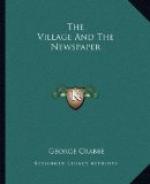Cease, then, that grief, and let those tears subside;
If Passion rule us, be that passion pride;
If Reason, reason bids us strive to raise
Our fallen hearts, and be like him we praise;
Or if Affection still the soul subdue,
Bring all his virtues, all his worth in view,
And let Affection find its comfort too:
For how can Grief so deeply wound the heart,
When Admiration claims so large a part?
Grief is a foe—expel him then thy soul;
Let nobler thoughts the nearer views control!
Oh! make the age to come thy better care,
See other RUTLANDS, other GRANBYS there!
And, as thy thoughts through streaming ages glide,
See other heroes die as Manners died:
And from their fate, thy race shall nobler grow,
As trees shoot upwards that are pruned below;
Or as old Thames, borne down with decent pride,
Sees his young streams run warbling at his side;
Though some, by art cut off, no longer run,
And some are lost beneath the summer sun —
Yet the pure stream moves on, and, as it moves,
Its power increases and its use improves;
While plenty round its spacious waves bestow,
Still it flows on, and shall for ever flow.
THE NEWSPAPER
E quibus, hi vacuas implent sermonibus aures:
Hi narrata ferunt alio; mensuraque ficti
Crescit, et auditis aliquid novus adjicit auctor:
Illic Credulitas, illic temerarius Error,
Vanaque Laetitia est, consternatique Timores,
Seditioque repens, dubioque auctore Susurri.
Ovid,
Metamorphoses
THE ARGUMENT
This not a Time favourable to Poetical Composition: and why— Newspapers enemies to Literature, and their general Influence—Their Numbers—The Sunday Monitor—Their general Character—Their Effect upon Individuals—upon Society—in the Country—The Village Freeholder—What Kind of Composition a Newspaper is; and the Amusement it affords—Of what Parts it is chiefly composed—Articles of Intelligence: Advertisements: The Stage: Quacks: Puffing—The Correspondents to a Newspaper, political and poetical—Advice to the latter—Conclusion.
A time like this, a busy, bustling time,
Suits ill with writers, very ill with rhyme:
Unheard we sing, when party-rage runs strong,
And mightier madness checks the flowing song:
Or, should we force the peaceful Muse to wield
Her feeble arms amid the furious field,
Where party-pens a wordy war maintain,
Poor is her anger, and her friendship vain;
And oft the foes who feel her sting, combine,
Till serious vengeance pays an idle line:
For party-poets are like wasps, who dart
Death to themselves, and to their foes but smart.
Hard then our fate: if general
themes we choose,
Neglect awaits the song, and chills the Muse;




